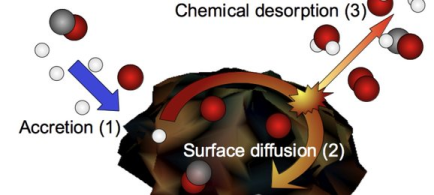Experimental evidence for major impact of micron-sized dust particles in the universe
A French/Dutch team of astronomers, including Stéphanie Cazaux from the Kapteyn Institute, University of Groningen, has proved via laboratory tests that molecules in microscopically small dust particles in space can be directly transformed into gas. These findings may have important consequences for theories on the chemical structure of the universe and the way stars are formed. The findings were published online in Nature Scientific Reports on February 26th.

Article: Dulieu, F. et al. How micron-sized dust particles determine the chemistry of our Universe. Sci. Rep. 3, 1338
http://www.nature.com/srep/2013/130226/srep01338/full/srep01338.html DOI:10.1038/srep01338 (2013)
More information:
Contact: Stephanie Cazaux, University of Groningen Kapteyn Institute
E-mail:
cazaux astro.rug.nl
More news
-
10 February 2026
Why only a small number of planets are suitable for life
-
09 February 2026
Can we make the earth spin in the opposite direction?
